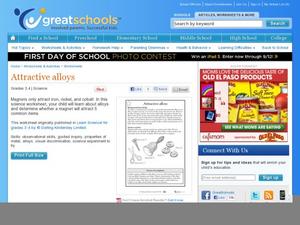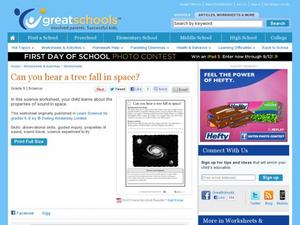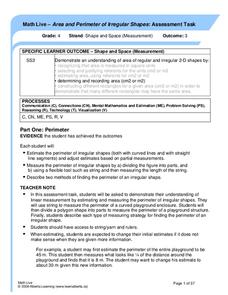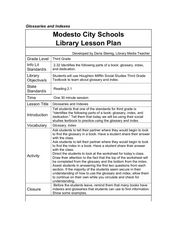Curated OER
Prefixes Aplenty
Introduce several new prefixes to your vocabulary lesson. After alphabetizing 19 prefixes, including pro-, geo-, and thermo, third graders use a dictionary to find one word that begins with each prefix. Extend the activity by having...
Curated OER
Proofreading
Do your second graders like riddles? Give them a giggle and a lesson about proofreading at the same time. After reading two riddles, young writers fix punctuation and capitalization errors. They write the answer to each riddle at the...
Curated OER
Silly Spoonerisms!
Looking for a fun activity for your vocabulary lesson? Bring a worksheet on "spoonerisms" to your fifth grade class. Kids decipher seven phrases that have mixed up the first letter sounds of each word. They then think of their own...
Curated OER
Verb Tenses
Discover how to use proper verb tenses with context clues. Five sentences help first graders decide if they should use -ed or -ing to end simple verbs. Each sentence provides context clues to indicate the time. Use the resource in...
Curated OER
All About Arthropods
Use a dichotomous key to classify these squirmy bugs. A paragraph provides fifth graders with some background knowledge on the animal kingdom, and explains how to use a branching key for classification. They then determine which bugs...
Curated OER
Attractive Alloys
Include a lab about alloys and magnets in your fourth grade science lesson. Young scientists read the necessary background knowledge about alloys, then choose which objects (a screw, a bell, scissors, or coins) will be attracted to...
Curated OER
Be Kind to Your Teeth
What kinds of food can be bad for your teeth? Kindergartners and first graders explore dental health with an interactive science inquiry. Given a choice of foods such as celery, cake, and milk, kids choose which ones are better for their...
Curated OER
Bones Provide Great Support!
How do bones help people move around? A science investigation prompts kids to draw arrows to certain bones that protect their organs. After they finish, they trace their hands on a piece of paper and trace the way their bones go. Great...
Curated OER
Can You Hear a Tree Fall in Space?
How does sound travel in space? Fifth graders investigate this question with a science activity, in which they research the properties of sound. Schedule a lab visit for individual Internet research, or include the activity after you...
Curated OER
Good Drugs, Bad Drugs
Add a science experiment on medicine and drugs to your health lesson. After reading a paragraph on the difference between helpful and harmful drugs, kids choose which pictures of bottles they could find at a pharmacy. The last activity...
Alberta Learning
Area and Perimeter of Irregular Shapes
Evaluate young mathematicians' understanding of area and perimeter with this series of three assessment tasks. Challenging students to not only calculate the area and perimeter of irregular shapes, but to explain in writing their...
Middle Tennessee State University
The Declaration of Independence: Its Legacy and Ideas in Today’s World
How is it possible that such an old document still triggers modern discussions? Teach scholars why the Declaration of Independence is still so important today using an informative resource. They watch various educational videos, work in...
Facing History and Ourselves
Why Little Things Are Big
Often our decisions are impacted by a fear of how others see us. That's the big idea in a two-day lesson that asks how false assumptions, how our fear of how others may see us, impact how we act. After watching a video about such a...
Facing History and Ourselves
Standing Up to Hatred on Cable Street
The final lessons in this section of the Standing Up for Democracy unit ask class members to consider ways they can help create a "more humane, fair, and compassionate environment" in their communities. For context, learners study how...
Facing History and Ourselves
Free Press Makes Democracy Work
A unit study of the importance of a free press in a democracy begins with class members listening to a podcast featuring two journalists, one from a United States public radio station and one from Capetown, South Africa. The lesson,...
Facing History and Ourselves
The Legacies of Reconstruction
The final lesson in the seven-resource Reconstruction Era collection examines the legacies of Reconstruction. Class members investigate why the period has been called an "unfinished revolution," "a splendid failure," and "the second...
Facing History and Ourselves
Bio-poem: Connecting Identity and Poetry
Writing a bio-poem is a great way to have young scholars go below the surface and reflect on who or what has made them who they are. Check out this richly detailed lesson that provides step-by-step directions for crafting a bio-poem.
Facing History and Ourselves
Mood Meter
Returning to in-class learning has proved to be a challenge for both teachers and learners. This series of 15 lessons provides instructors with ideas about establishing or re-establish classroom protocols and opening or closing routines...
Facing History and Ourselves
Compass Points
Needs, Suggestions, Excitement, and Worries. A Compass Points worksheet asks pupils to give feedback on that day's lesson. Learners identify what they need from the instructor and classmates, what excites them about the class, what...
Facing History and Ourselves
Frame a Special Item
If you could frame something important to you, what would it be, where would you hang it, and why would you choose this particular thing to frame? These questions launch a lesson designed to help class members get to know each other....
Facing History and Ourselves
Teaching Strategy: Contracting
The final lesson in the First Days of School series focuses on how to build a classroom community where all class members can feel safe, heard, and valued. The resource includes step-by-step directions for engaging pupils in developing...
Facing History and Ourselves
Making Meaning of Community
In the post-pandemic classroom, it's more important than ever to begin the school year by building a strong sense of trust and community. Using the Make Meaning and Big Paper teaching techniques, groups develop a definition of community...
Curated OER
Glossaries and Indexes
Fourth graders identify parts of a book including the glossary, index, and dedication. In this glossary and index lesson, 4th graders complete a worksheet after studying the glossary and index from a Houghton Mifflin Social Studies...
Curated OER
Step Into the Past: Change and Growth in Arkansas
The concept of change over time is presented in this history instructional activity. In it, learners discuss how some things stay the same over time, while other things change. Teams of students research and create a timeline of...
Other popular searches
- Fifth Grade Library Lessons
- Library Lessons K 2
- Elementary Library Lessons
- Library Lessons & November
- Kindergarten Library Lessons
- Library Lessons Grade
- Library Lessons for Preps
- Halloween Lessons Library
- Teks Library Lessons
- Library Lessons on Blogs
- Third Grade Library Lessons
- Library Lessons Grade 7























